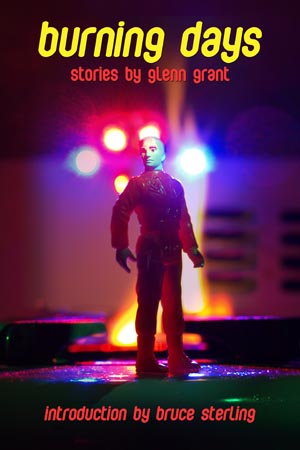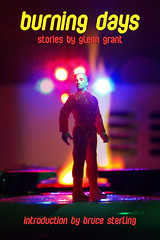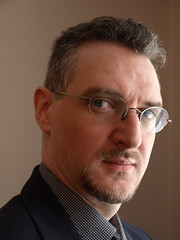Readercon 23 was a blast. I had a fantastic time — as usual. Readercon has been my favourite convention since I started attending with Readercon #2 in 1989!
Most of my panels were fun, but none more so than “Oblique Strategies for Authors”. The idea is a riff on the Oblique Strategies card deck produced by Brian Eno and Peter Schmidt back in the 1970’s. Each card provides a cryptic directive —- such as “Use an old idea” or “Honour thy error as a hidden intention” —- intended to help an artist deal with a creative block or dilemma. You just draw a random card and do whatever it says to do; this may involve a convoluted interpretation of the often-cryptic message on the card.
While many of the original strategies are useful for writers of fiction, others (such as “The tape is now the music”) are perhaps only appropriate for musicians and visual artists. So my plan was — with the help of my fellow panelists Marilyn “Mattie” Brahen, Gavin J. Grant, Katherine MacLean, Eric M. Van, and Jo Walton — to brainstorm a deck of Oblique Strategies specifically designed to provide unexpected creative kicks for authors who are in a jam.
We kicked the concept around for about half an hour, examining such questions as “What makes a good Oblique Strategy?” — “short, pithy, but slightly vague and cryptic” was the consensus — then I asked for contributions from each of the panelists and audience. I wrote down at least one suggestion from nearly every person in the room before we ran out of time. The results appear below. Perhaps coincidentally, some of these closely resemble and even duplicate a few of the strategies invented by Schmidt and Eno back in the 1970’s.
If you like, you can print these out onto punch-out business cards and try them for yourself. You may wish to combine them with some of Eno and Schmidt’s strategies, or come up with additional cards your own.
If you use such a deck to help you solve create problems in your writing, please do comment here and let me know if these strategies proved useful for you.
Oblique Strategies for Authors
As suggested by participants at Readercon 23:
+1
Go back
Let me think
Invert the structure
Is it worth the effort?
What’s the other end of the conversation?
Throw away the most important thing
Develop your own cliché[s] [attributed to Robert Fripp]
Use your hands
Doorbell rings
Steal a cliché from a different genre
Do it wrong
Crush it with a rock
Make it rain
Villains love their mothers too
Branch out
Eat your hat
Rename something
Lighten the load
Change your socks
Write someplace else
Try synesthesia
Be wrong on purpose
Do it without breathing
Sing it
Rewire the diagram
Don’t hit a hippo
Step back
Spin around and pick something randomly
Be your own deity
Check gender and age
Contradict what went before
Reverse!
Add trauma
What would history think?
Take out a pin
Anarchy now!
Deliberate on the significance of hats
What would your favourite author do?
See the forest for the trees
Thanks to the all the contributors!



